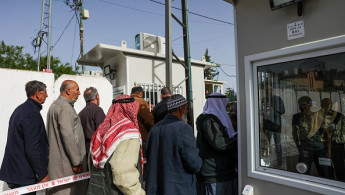Israeli Defence Minister Gallant extends closure of West Bank, cancels easing of restriction on Palestinians going to Jerusalem
Israel's Defence Minister Yoav Gallant extended on Saturday Israel's closure of the occupied West Bank and the besieged Gaza Strip, amid intensified Israeli violence in the Palestinian territories.
The closures will remain in place until the end of the Jewish holiday of Passover on 12 April, the Israeli Kan broadcaster said, due to what was described as "the security situation".
The checkpoint was due to re-open on Saturday evening and remain so until 11 April, before a second closure until the end of the Passover holiday was due to be implemented.
Gallant’s decision cancels exceptions enabling Palestinians from the West Bank to cross into Jerusalem and to access the Al-Aqsa Mosque, which were initially eased for the holy month of Ramadan.
Concessions however, will be made for humanitarian and exceptional cases, the defence minister said in a statement.
He further added the Israeli army will be ordered to join the police forces in central Israel, sources said, as cited by The New Arab’s Arabic-language sister site, Al-Araby Al-Jadeed.
Closures affecting the besieged Gaza Strip also impact the closure of the commercial crossings of Kerem Shalom and Beit Hanoun - also known as Erez -, hindering movement for most Gazans, particularly those who work outside the besieged enclave’s borders.
West Bank Palestinians who work in Israel will also bear the brunt of the closure extensions, as they require permits to enter the country, which will now be suspended.
The announcement came after Israeli troops brutally stormed the Al-Aqsa Mosque compound on Tuesday, physically assaulting hundreds of Muslim worshippers. Between 400-500 Palestinians were arrested in the incident, which sparked widespread global outrage and condemnation.
A similar incident took place the following day, Wednesday, where Israeli forces attacked worshippers with rubber bullets and sound bombs, before expelling them from the premises.
Since the start of Ramadan over two weeks ago, Israeli troops have attempted to block Palestinian worshippers from spending nights inside the Al-Aqsa Mosque in a religious practice common in Ramadan known as itikaf, where Muslims spend long periods inside a mosque in order to devote themselves to worship.
Israeli violence has also intensified in other parts of the occupied territories. On Saturday night, a 20-year-old Palestinian man was killed by Israeli forces who raided the town of Azzun, near Qalqilya in the West Bank. Meanwhile, forces shot and wounded two unidentified Palestinian men in Burqin, near Jenin on Friday.
Israeli incursions in the West Bank, which began in March 2022, have increased following the re-election of Benjamin Netanyahu as prime minister of a far-right Israeli coalition government.
Many of his ministers, including Itamar Ben-Gvir who has the national security portfolio, have made violently inflammatory comments against Palestinians before.





 Follow the Middle East's top stories in English at The New Arab on Google News
Follow the Middle East's top stories in English at The New Arab on Google News
![Netanyahu furiously denounced the ICC [Getty]](/sites/default/files/styles/image_330x185/public/2024-11/GettyImages-2169352575.jpg?h=199d8c1f&itok=-vRiruf5)
![Both Hamas and the Palestinian Authority welcomed the ICC arrest warrants [Getty]](/sites/default/files/styles/image_330x185/public/2024-11/GettyImages-2178351173.jpg?h=199d8c1f&itok=TV858iVg)
